
Swimming with Care at Windermere is a funded collaboration between PhD Researcher Taylor Butler-Eldridge and illustrator Bethan Thorsby.
This collaboration sparked the co-creation of a small research zine, which illustrates the social, cultural, political, and environmental stories concerning outdoor swimming at Windermere. The stories follow 12 months of Taylor’s immersive ethnographic research in the outdoor swimming communities at the Rayrigg Meadow and Millerground designated public bathing sites between September 2022 – 2023.
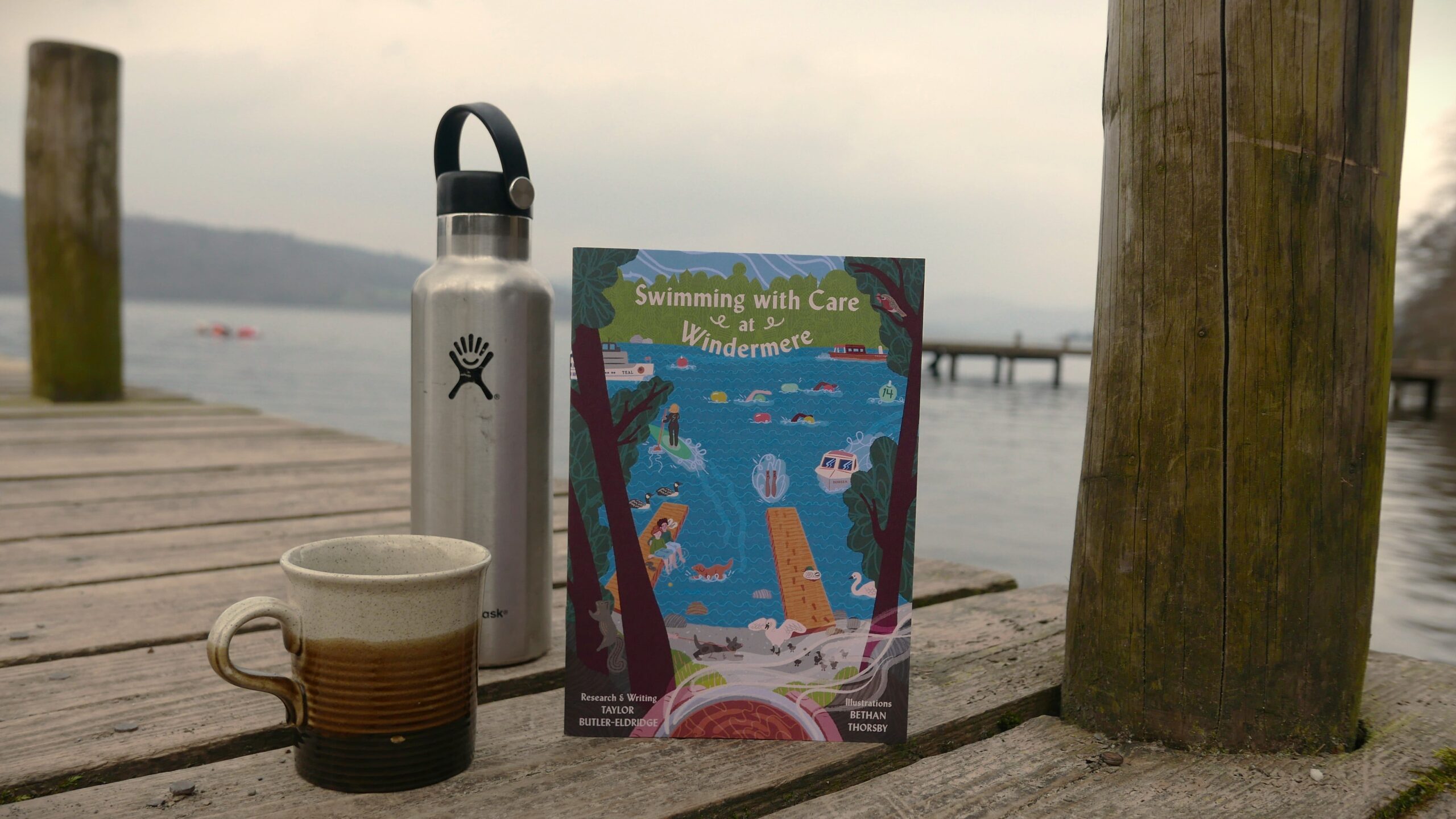
The research forms part of Taylor’s PhD – funded by the University of Exeter (Geography), the Economic and Social Research Council, and the South West Doctoral Training Partnership since September 2021. Taylor’s research featured 40 ‘swim-along’ interviews with different swimmers and dippers, and 60 independent swims, questioning the motivations and responses, both in and out of the water.
Bethan’s local connection to Windermere has provided further insights into the histories and user groups sharing these iconic waters. Bethan grew up (and continues) swimming at Millerground, worked in Lewis’ café (Bowness) for 7 years, and her family has connections to the boats on Windermere. Bethan’s Grandad grew up around the boats and was once a director of the Windermere Lake Cruises. Her Grandmother (now also on the board) moved to Windermere in the ’70s, met her Grandad, and married. Bethan’s Mum, Dad, Auntie, and sisters have all worked on the boats.
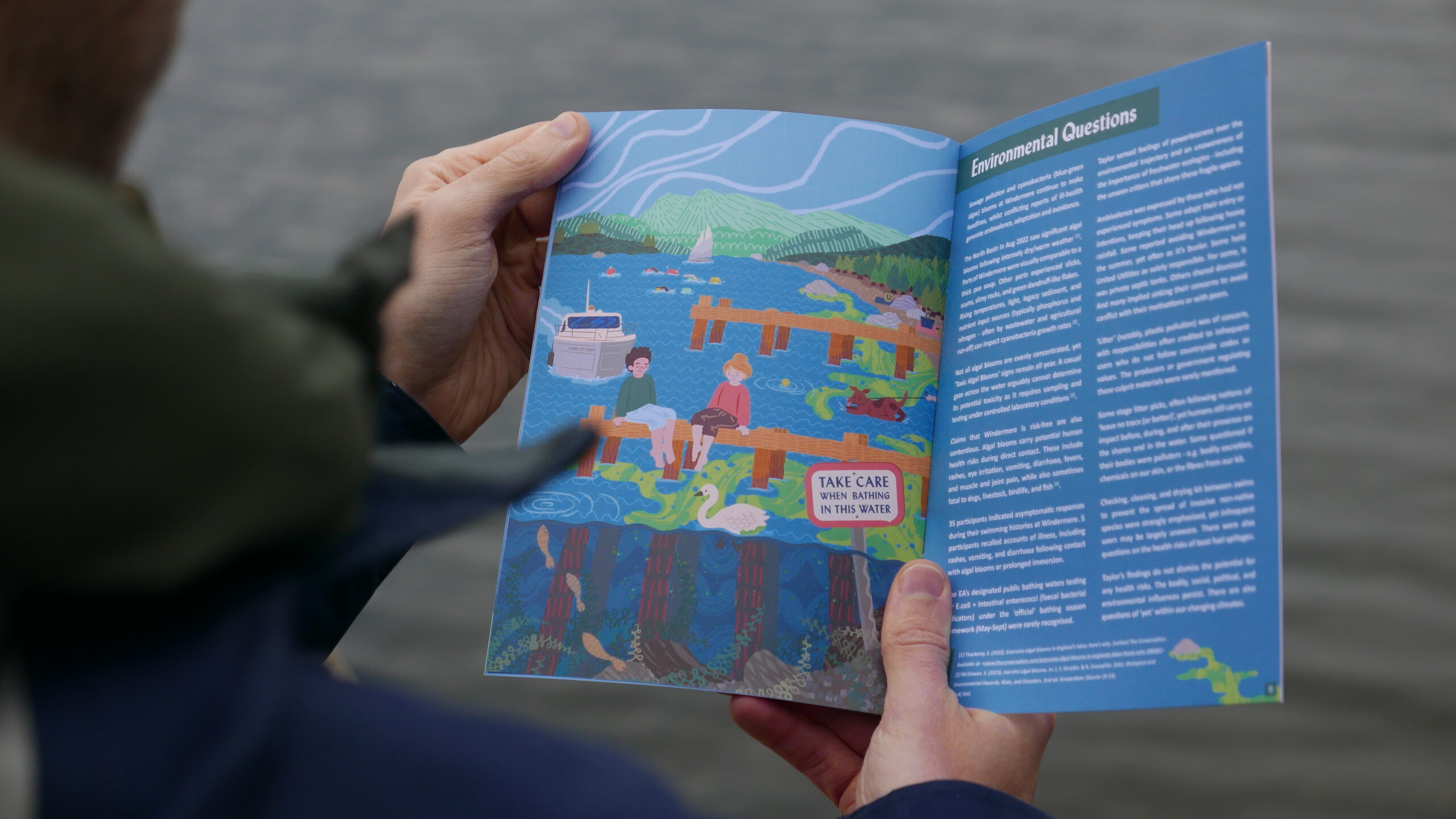
Concerns at Windermere are reimagined by combining Taylor’s research reflections, Bethan’s illustrations, and the stories shared by different swimmers and dippers during the research. The zine also draws upon social and environmental concerns of outdoor swimming more broadly.
The zine makes reference to notions of care, questioning how swimmers at Windermere might ‘take care’ of themselves, their communities, and these shared yet fragile environments. It shares conflicting accounts of joy, overcoming, tension, and ambivalence, disrupting simplified understandings of well-being and ill-health.
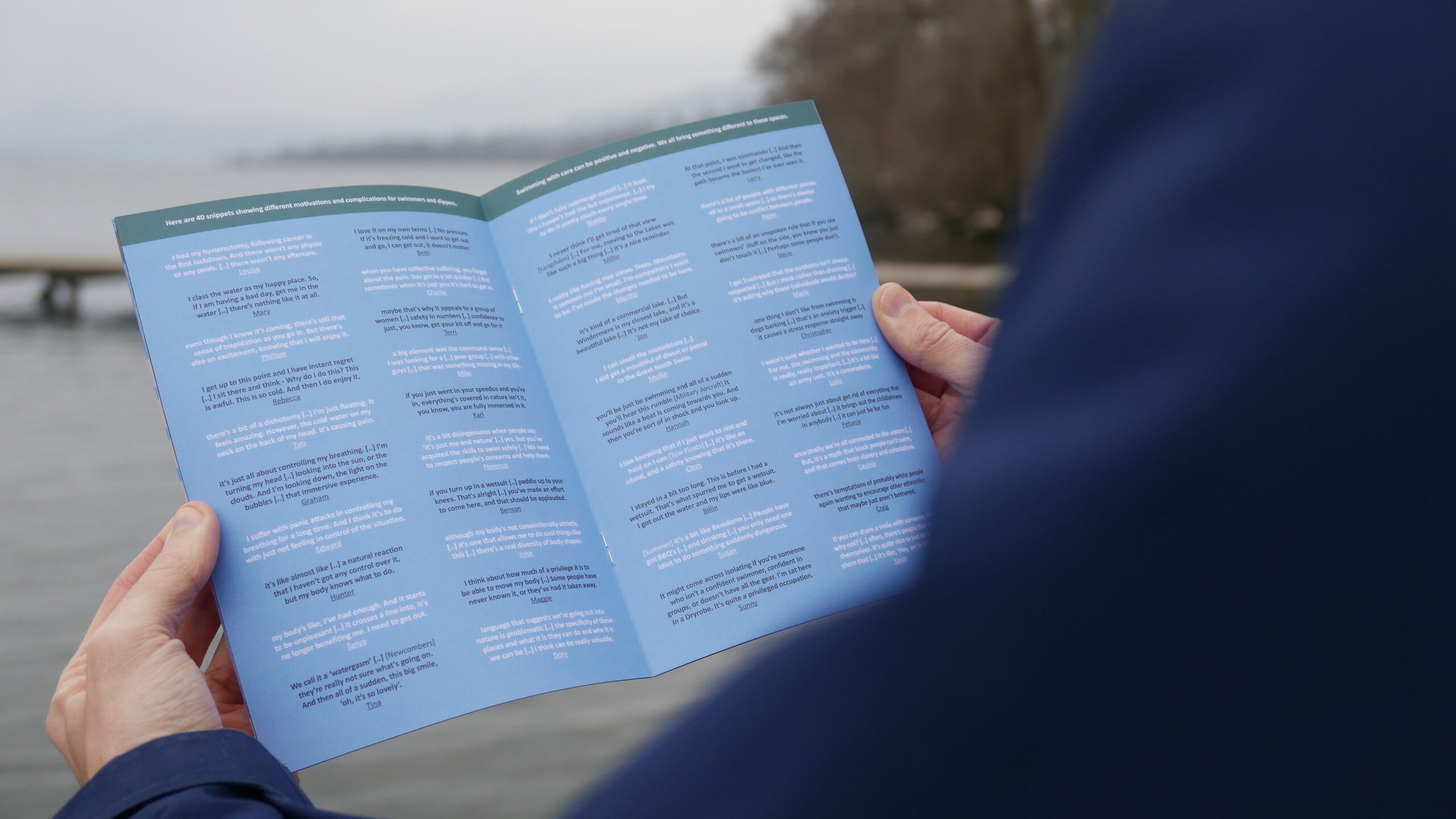
This zine illustrates more opportunities, directions, and questions of care. Specifically, these care-ful reminders advocate for safer outdoor swimming, biosecurity, conservation engagement, critical readership, questioning political powers, and sharing our positive (and negative) experiences.
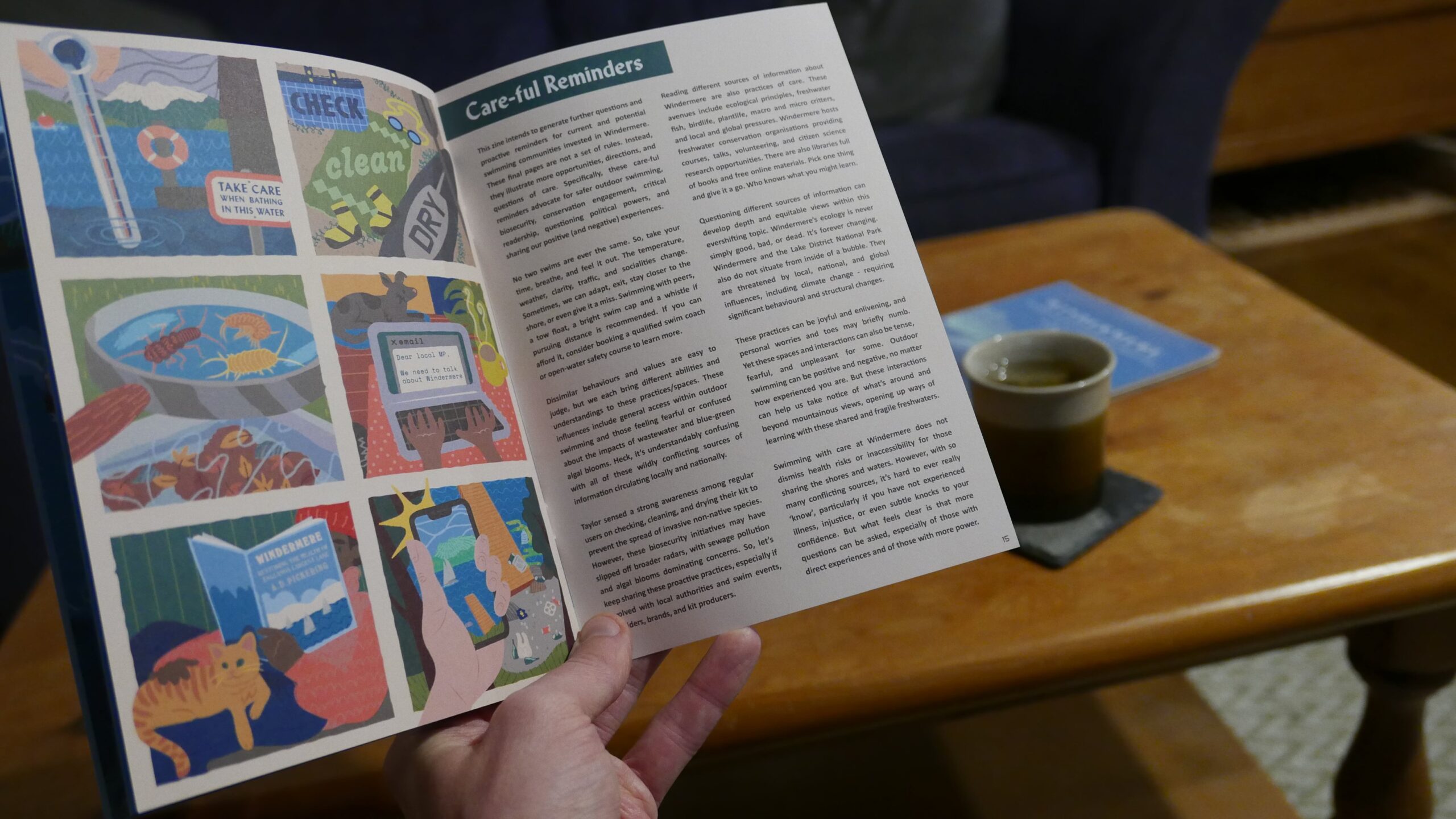
Taylor and Bethan have invested countless hours, energy, and creativity into this collaboration. This process has been deeply fulfilling, with many texts, revisions, brews, and pizza slices exchanged. Admittedly, it took longer than they had imagined. However, they challenged and supported each other. They formed a friendship through their work and mutual care for these watery spaces.
They both feel emotional that this collaboration is over but hope the zine sparks empathy and advocacy for these shared and fragile freshwaters.
This zine is not an authoritative guideline. Instead, it generates further questions and proactive reminders for current (and potential) swimming communities invested in Windermere. Additionally, this zine offers a thank you and a keepsake for the participants and the supporters.
So, grab your copy of the zine below, take a read, and let Taylor @swimdermere, and Bethan @sporadicillustration know what you think.
Thank You.
* The zine has been printed on recycled, uncoated paper.
Grab a Copy
You can download a copy of the research zine below. A limited number of zines were printed. So, if you would like a physical copy, Taylor may be able to source some for you. You can find more of Bethan’s artwork on Instagram @sporadicillustration.
If you have any feedback or queries about the zine, please contact Taylor.
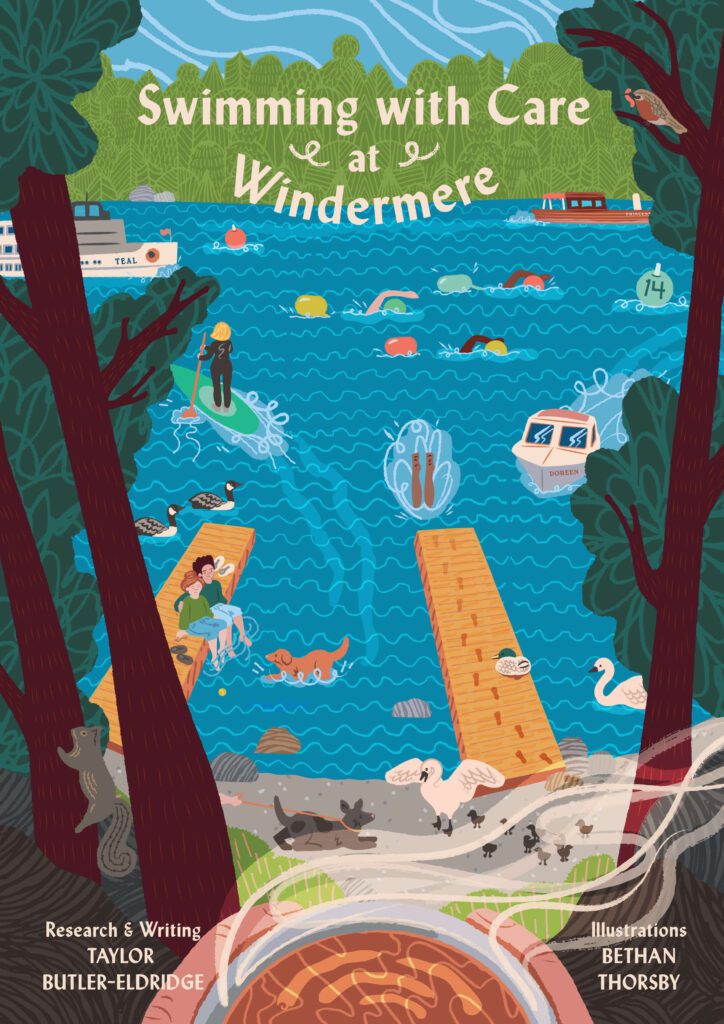
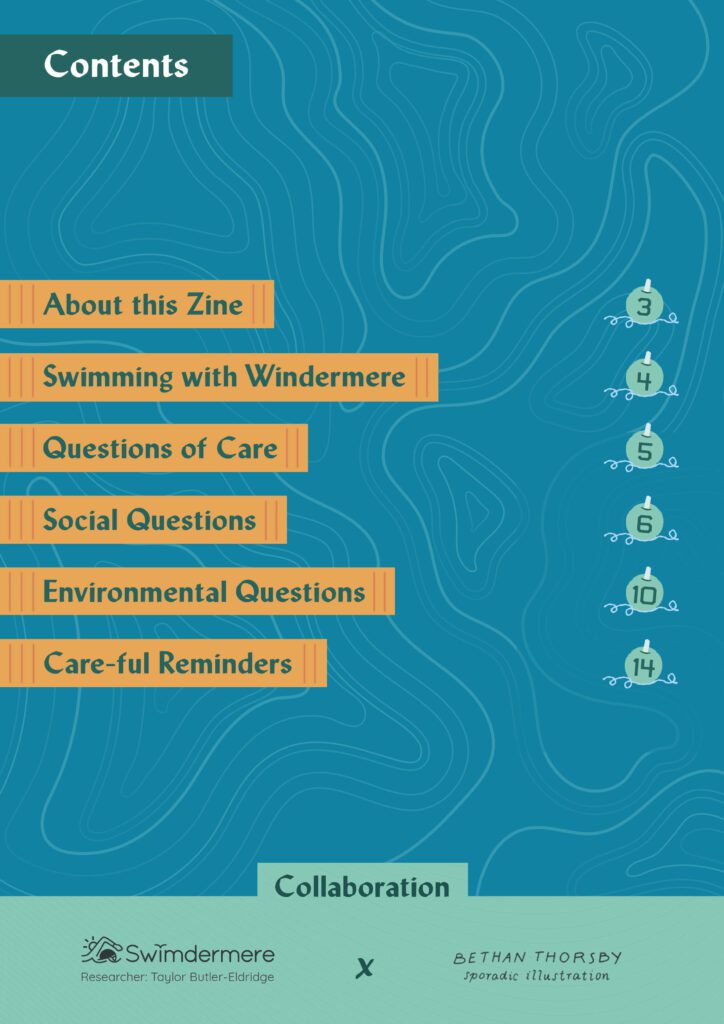
Zine Feedback
The zine is a great talking point for discussing water quality in Windermere and how we as swimmers interact with our environment. Especially when opinions in the community are often polarised – the lake is full of sewage Vs there’s nothing wrong with the water, it’s crystal clear. It is a useful introduction to issues around water quality and wellbeing and how the local issues in Windermere are part of a wider national discussion of water quality as well as being part of an even bigger conversation around climate change. I have handed the zine out to local community members and visitors/tourists in a local shop I work at, and they have been very interested in the issues raised and opinions of the different swimmers interviewed.
Hunter (Swim-along Interview Participant)
A delightful booklet that is beautifully designed, a pleasure to look at the lovely artwork but also very informative. The interviews conducted show there is a great connection to Windermere. An informative, well-rounded guide to how users see Windermere, the benefits of swimming in it and also the issues facing Windermere. It looks at all aspects of issues with Windermere from an educated way and endeavours to educate people clearly on what risks there may be but also doesn’t sensationalise the issues as the media does. You can see the passion from the many interviews and excerpts of those interviews, that swimmers aren’t put off but also have concern and want to promote care of the environment they use. As a coach this booklet is a great place to sign post people to before their swimming journey or during it. It gives good insight into how to care for the environment that is caring for us. It has some great teaching points in it that open discussion within our sessions.
Heather Meek (Swim Coach, South Lakes Swimming)
Taylor’s research has been vital in gathering collective views, from swimmers of all backgrounds and expertise on the perceived health of Windermere and how it affects their practice as well as knock-on effects of well-being, sport and social connections in the catchment. His research has brought fellow swimmers together from varying backgrounds to participate in the study, including myself. It presented the ideal opportunity for swimmers to look inwards about how the practice can impact the surrounding area and highlight unintended consequences as well as overall benefits. The study around ‘care’ and connections formed has created a central point for discussions around health, well-being and sharing of opinions of impacts on the lake, and what swimmers can do to encourage others and look after the area. Throughout his time studying Windermere, Taylor has also brought researchers and professional bodies together to share important evidence-based information about the lake’s biggest challenges and how water users can get involved to help with on-going research.
Hannah (Swim-along Participant)
Just casually reading through my “Swimming with care at Windermere” zine, thoughtfully written by Taylor Butler-Eldridge and wonderfully illustrated by Bethan Thorsby. This zine focuses on the research conducted by Taylor as part of his PhD, capturing the social, cultural, political and environmental stories of outdoor swimming at Windermere. Often friends and family will ask me “Is the water safe?” and whilst I might be able to make a broadly informed response, the scientist in me wants this supported with evidence. Thank goodness for water quality monitoring programmes like the long-term lakes monitoring by UKCEH though for swimmers, shoreline conditions remain sparsely monitored. However, more often than not I rely on my own observations and whether or not I’m happy to risk it. I often do (I have massive FOMO). Back with my scientist hat on this zine contains invaluable information about what, where and how environmental information is obtained and engaged with by outdoor swimmers and dippers. Such information is integral to improve scientific engagement.
Heather Moorhouse (Freshwater Ecologist, UK Centre for Ecology and Hydrology)
Taylor Butler-Eldridge has published a zine and I have a hard copy! ‘Swimming with Care at Windermere’ is a fab collab between Taylor and illustrator Bethan Thorsby. It is a gift to his participants, an accessible form of advocacy, a distillation of a year of ethnography, a sharing of key research themes. Well done Taylor – it is powerful output from your PhD.
Nicola Thomas (Professor of Historical and Cultural Geography and Head of Geography, University of Exeter)
Love this booklet. Really well conceived. Well done!
Mark Christie (Senior Lecturer of Sport and Physical Activity Development, University of Cumbria)
My experience of the interview was really positive, it felt a good place to share my thoughts about swimming at Windermere and the impact on the land and people in lots of ways. It was lovely and also really thought provoking to receive the zine after, and it is made me continue to consider swimming in Windermere and the quality of the water. I also loved seeing the zine displayed at Fell Bar (Kendal). Felt good to have been part of it.
Martha (Swim-along Interview Participant)
After participating and receiving the zine, I passed on your contact details to our Darlington Wild Swimmers group. We have members now water quality testing at our usual River Tees swim spot at Gainford. Quality is good I might add! Carry on the good work.
Mollie (Swim-along Interview Participant)
Just read through this [zine] – really impressive. Very clearly written and beautiful illustrations! Great work, Taylor and Bethan!
Lewis Winks (Environmental Social Science, Education and Advocacy, University of Exeter)
I had such a lovely time participating. It was very well organised. The questions asked were thought provoking, especially about environmental topics that I hadn’t really thought about before. The zine was also a joy to receive and read. Thank you.
Billie (Swim-along Interview Participant)
As a fellow doctoral researcher and occasional outdoor dipper, I’ve really enjoyed being involved in and engaging with Taylor’s research. As an interviewee for the research, I felt I was contributing to something which didn’t often have a voice or was often sidelined by some of the louder or more sensationalised voices in the outdoor swimming world. To explore the human side of outdoor swimming at Windermere felt poignant and responsive to current circumstances. I really enjoyed seeing the zine and appreciated having something physical in return – the artwork is beautiful and made this a really valuable keepsake for me.
Dory (Swim-along Interview Participant)
I come from a non-academic family and I am dyslexic. Taylors zine shares his in-depth research on wild swimming at Windermere, but also care considerations for our waterways in an extremely inclusive way. This is achieved with considered text and understandable visuals. Research can be extremely problematic in accessibility to early career researchers, students and the general public. These events and public outputs Taylor have created help bridge those barriers.
Nicola Dixon (PhD Research Artist, Arts and Humanities, Manchester Metropolitan University)
I thought your research topic is on one of, if not the most, discussed issues in the South Lakes, so it is very timely. I love that your research spoke to multiple demographics within the swimming community and the way you conduct the research feels very genuine. I felt super safe when doing my interview and that you took what I was saying seriously and in an unbiased way. The zine was great! The art was amazing, and the information was easy to understand and was relevant.
Clem (Swim-along Interview Participant)
The zine makes the research really accessible, it’s very informative but not at all patronising. It’s such a delightful book that you just want to hold it and look through it. It’s such an excellent communication method! I also love the excerpts from the interviews, showing the diversity and complexity of thoughts and feelings of swimmers/dippers.
Sophie Guinard (Windermere Science Evening Attendee)
I’m a neurodivergent artist who is currently producing a new documentary about place attachments to/with Windermere. This zine gave me access to the world of research surrounding Windermere. The illustrations and the beautiful pace of text made this inclusive and approachable for me.
Juliet Klottrup (Artist and Filmmaker)
Accessibility of Information: the zine makes complex research accessible to a broader audience. I found the visual and textual elements effectively communicate important health concerns to those who may not engage with academic literature. Community Engagement: The zine made me think differently about the importance of community dialogue around social and environmental issues. I particularly found the way it encourages active participation inspiring. Call to Action: I found the way the zine not only informs but also inspires action really helped me think about the importance of research legacy. Educational Value: The zine empowers readers with knowledge about environmental health issues. Interdisciplinary Approach: I found the zine’s interdisciplinary nature integrates insights from various fields, which could appeal to a wider range of funding bodies interested in transdisciplinary creative and innovative approaches. Visual Appeal: The design and aesthetics of the zine were compelling and really helped garner my interest and attention – this will help reach and engage different audiences. Collaborative Opportunities: I am sure there is the potential for future collaborations as a result of the wide reach and accessibility of the zine. Reaching a diverse audience will have sparked ideas and conversations across many different interested stakeholders creating exciting opportunities for future collaborations.
Gemma Lucas (PhD Researcher, University of Exeter)
That was such an amazing two days. It was so generous of you to invite me – being there as an artist alongside so many varied and accomplished practitioners as an equal. Thank you for making a seat at the table for me!
Julliet Klottrup (Visual Artist and Film Maker)
Reading the zine and participating in a swim along interview in Windermere itself focused my mind on why I swim there and why I sometimes avoid swimming there, especially in summer. It also made me think carefully about the benefits I and others derive from the practice of swimming and dipping in cold water, as well as concerns about the presence of pollutants and algae as well as my own impact on the environment both in and out of the water. The follow-up science evening organised by Taylor was excellent and improved my knowledge of Windermere and the work that goes on behind the scenes to understand the impact of humans and improve water quality.
Tina (Swim-along Interview Participant)
Having moved away from Windermere and having failed to get back into the habit of swimming regularly where I now live, the zine reminded me of how much I loved it, and how much I got out of the whole experience. It’s reignited my enthusiasm not only for swimming, but for new adventures, the value of a sense of community and the need to push yourself out of your comfort zone. For me anyway, life has only been at its best when I’ve learned these lessons and practised them, over and over again. I’d forgotten once more and was very glad to be reminded. Tomorrow is a new day and a new start and yet again, the opportunity for a new adventure. Life is never over till you stop living it. Thank you, Taylor and Bethan for reminding me of that, it was just the push I needed. I was impressed by the very individual and very clever way Taylor and Bethan got across so many views and concepts that could have been dry or technical or boring, but which weren’t at all because of how they handled it. It was a pleasure to be part of it and a pleasure to read it! It made me remember and realise how lucky we were to live that life and how special it was and how privileged we were. For purely geographic reasons many people may never be as privileged, but I think the zine still has the power to inspire.
Beth (Swim-along Interview Participant)
Having recently returned to the Lake District, and as someone new to wild swimming I found the Windermere Science Evening event and zine incredibly informative. There is a lot of media attention on the state of Windermere and being able to hear first-hand about the experiences of swimmers, and from experts, I felt I was able to come away better informed about what is a complex and nuanced debate.
Lauren Wise (Windermere Science Evening Attendee)
A fabulous Zine, perfectly balanced content, brilliant happy, visual illustrations, a really useful publication for lake using individuals and communities.
Benson (Swim-along Interview Participant)
I became aware of Taylor’s research through our involvement with the blue mind men swimming group in the Lake District. As a scientist and a frequent swimmer, I was keen to participate in the research as I feel there is a lot of fear and potentially misleading claims about water quality on the lake which were not supported by my own experiences. Taylor has a calm, reassuring, and methodical manner and took care to ensure that as a participant I knew what to expect and was comfortable with the process. I felt very included in Taylor’s research and enjoyed all the outputs I’ve seen so far including the zine and the presentation of early results that was filmed for YouTube.
John (Swim-along Interview Participant)
As a regular year-round swimmer in the lake, I found Swimming with Care at Windermere a fascinating read. This zine presents a balanced commentary on both the social and environmental issues facing Windermere, in a space where balance is sometimes severely lacking. The zine exposed me to points of view that exist beyond the ‘bubble’ of my usual swim companions, views that I had never considered until reading the zine such as the barriers certain people face in accessing the water, what different people take from the experience of swimming, and how different people come to terms with the complex issues surrounding the health of the lake. After reading the zine I have reconsidered my previously simplistic stance on the issue of litter and plastic pollution at lakeshore sites. The zine has been well-received by local swim groups, including Blue Mind Men, a men’s group that I swim with. Swimming with Care at Windermere is also a beautifully produced piece of art.
Phillipe (Swim-along Interview Participant)
The ‘Swimming with Care at Windermere’ collaborative research zine produced by Taylor and Bethan is an object lesson in the kinds of simple clear research findings that academic research should be doing more of. It also ticks all the boxes in terms of outreach and public engagement and the combination of bite-sized findings with creative illustration works incredibly well. The different sub-sections of the findings on health, wellbeing and environment are very insightful and provide a really effective format for other researchers to consider and use. But equally swimmers and other outdoor enthusiasts will get a really good sense of what the research was about – both from the quotes and the surrounding short written pieces – that I think will resonate with them. The bite-size approach is effective as the sum of the parts, and also honours all the research participants in some form or other, which can often be lost in more selective papers or book chapters. Finally, the attention to visual design and the beautiful illustration lifts the whole work and draws the non-expert reader in, in ways traditional text-based output can’t. It doesn’t lessen the power of the findings, but in fact gives them extra oomph in the real world. The zine also works very well as a form of gentle activism, showing but not telling how important and valued place-care is, and this kind of format is a model for other work around maintaining our sensitive freshwater and coastal spaces as well as we can.
Ronan Foley (Health Geography, Maynooth University)
Funded By



This research zine has been funded by the Economic and Social Research Council, South West Doctoral Training Partnership, and the University of Exeter (Geography)
Get in Touch
For more information about the research, please visit the About Project page.
Or get in touch by clicking the button below.
